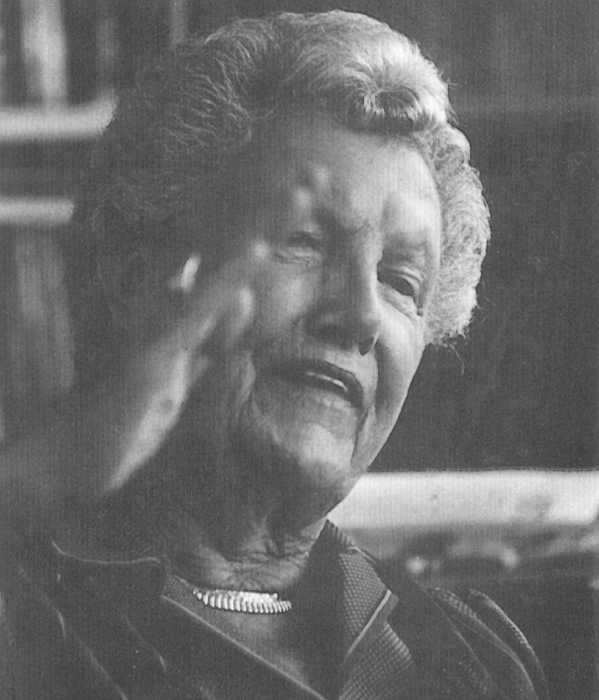The Bull from the Sea (35 page)
Read The Bull from the Sea Online
Authors: Mary Renault

The quota from Athens was seven youths and seven maidens. Among these went Theseus; according to most versions, by his own choice, though others say by lot. At his departure, his father charged him to change the black sail of the sacrificial ship to a white one, should he return alive.
On his arrival at Crete, Minos mocked his claim to be the son of Poseidon, and challenged him to retrieve a ring thrown into the sea. Theseus received from the sea-nymphs not only the ring but the golden crown of Thetis. His exploit caused Minos’ daughter Ariadne to fall in love with him; she gave him in secret a ball of thread with which to retrace his steps through the Labyrinth, and a sword to kill the Minotaur.
This deed accomplished, Theseus gathered the Athenian youths; but the girls were imprisoned apart. Theseus had prepared for this in Athens by training two brave but effeminate-looking boys to take the place of two girl victims. These unbarred the women’s quarters, and all the victims escaped to Athens, taking with them Ariadne, whom, however, Theseus abandoned on the island of Naxos. Dionysos, finding her there, became enamored of her and made her the chief of his maenad train. Coming in sight of Athens, Theseus forgot to change the mourning sail for a white one, with the result that Aigeus in grief leaped off the Acropolis, or off a high rock into the sea. Theseus thus succeeded to the throne.
During his reign he is said to have unified Attica and given laws to its three estates of landowner, farmer, and craftsman. He was famed for his protection of ill-used servants and slaves, for whom his shrine remained a sanctuary down to historic times. Pirithoos, King of the Lapiths, raided his cattle as a challenge; but the young warriors took to each other in the field and swore eternal friendship. Theseus took part in the Kalydonian boar-hunt and the battle of the Lapiths and Kentaurs, and is said to have emulated the feats of Herakles. In a foray against the Amazons he carried off their Queen, Hippolyta. Later her people in revenge invaded Attica; but Hippolyta took the field at Theseus’ side, where an arrow killed her. Before this, however, she had borne him a son, Hippolytos.
After her death, Theseus sent for and married Phaedra, King Minos’ youngest daughter. Hippolytos was now a strong and beautiful youth, devoted to horsemanship and to the chaste cult of Artemis, his mother’s tutelary deity. Soon Phaedra was seized with a consuming passion for him, and begged her old nurse to plead her cause. Upon his shocked refusal she hanged herself, leaving a letter which accused him of her rape. Theseus, convinced by the fact of her death, drove out his son, and invoked the death-curse entrusted to him by his father, Poseidon. As Hippolytos drove his chariot along the rocky coastal road, the god sent a huge wave, bearing on its crest a sea-bull, which stampeded his horses. His battered corpse was brought back to Theseus, who had learned the truth too late.
Thereafter, Theseus’ luck forsook him. While helping in Pirithoos’ attempt to abduct Persephone, he was confined in the underworld in torment for four years, till Herakles released him. On his return he found Athens sunk into lawlessness and sedition. Failing to restore the rule of law, he cursed the city and set sail for Crete. On the way he stopped at Skyros, where through his host’s treachery he fell off a high rock into the sea.
Mary Renault (1905–1983) was an English writer best known for her historical novels on the life of Alexander the Great:
Fire from Heaven
(1969),
The Persian Boy
(1972), and
Funeral Games
(1981).
Born Eileen Mary Challans into a middle-class family in a London suburb, Renault enjoyed reading from a young age. Initially obsessed with cowboy stories, she became interested in Greek philosophy when she found Plato’s works in her school library. Her fascination with Greek philosophy led her to St Hugh’s College, Oxford, where one of her tutors was J. R. R. Tolkien. Renault went on to earn her BA in English in 1928.
Renault began training as a nurse in 1933. It was at this time that she met the woman that would become her life partner, fellow nurse Julie Mullard. Renault also began writing, and published her first novel,
Purposes of Love
(titled
Promise of Love
in its American edition), in 1939. Inspired by her occupation, her first works were hospital romances. Renault continued writing as she treated Dunkirk evacuees at the Winford Emergency Hospital in Bristol and later as she worked in a brain surgery ward at the Radcliffe Infirmary.
In 1947, Renault received her first major award: Her novel
Return to Night
(1946) won an MGM prize. With the $150,000 of award money, she and Mullard moved to South Africa, never to return to England again. Renault revived her love of ancient Greek history and began to write her novels of Greece, including
The Last of the Wine
(1956) and
The Charioteer
(1953), which is still considered the first British novel that includes unconcealed homosexual love.
Renault’s in-depth depictions of Greece led many readers to believe she had spent a great deal of time there, but during her lifetime, she actually only visited the Aegean twice. Following
The Last of the Wine
and inspired by a replica of a Cretan fresco at a British museum, Renault wrote
The King Must Die
(1958) and its sequel,
The Bull from the Sea
(1962).
The democratic ideals of ancient Greece encouraged Renault to join the Black Sash, a women’s movement that fought against apartheid in South Africa. Renault was also heavily involved in the literary community, where she believed all people should be afforded equal standard and opportunity, and was the honorary chair of the Cape Town branch of PEN, the international writers’ organization.
Renault passed away in Cape Town on December 13, 1983.

Renault in 1940.
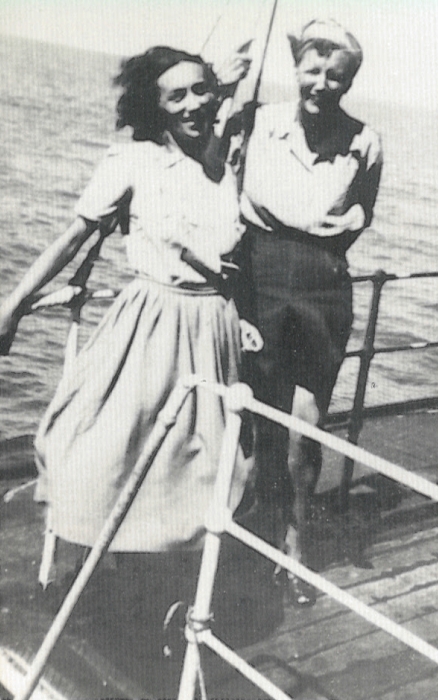
Renault and Julie Mullard on board the
Cairo
in 1948, on their way to South Africa, where they settled in Durban.
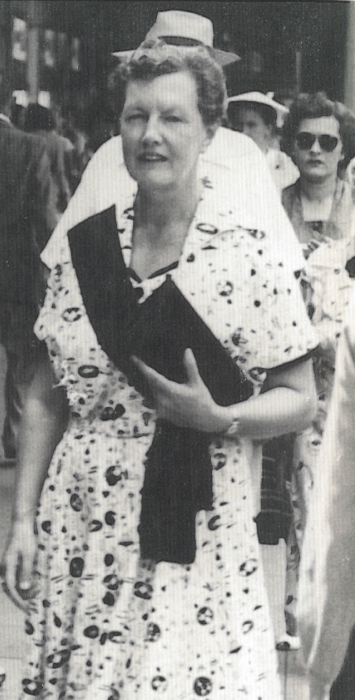
Renault in a Black Sash protest in 1955. She was among the first to join this women’s movement against apartheid.
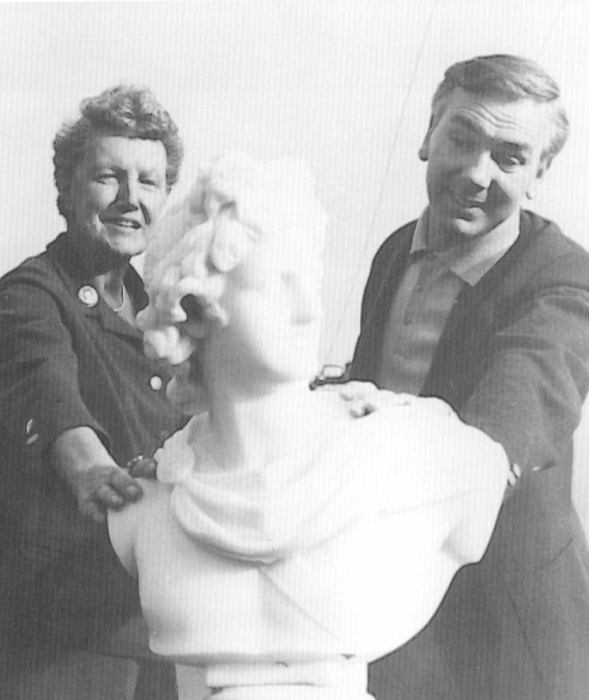
Renault and Michael Atkinson installing her cast of the Roman statue of the Apollo Belvedere in the garden of Delos, Camps Bay, in the late 1970s.
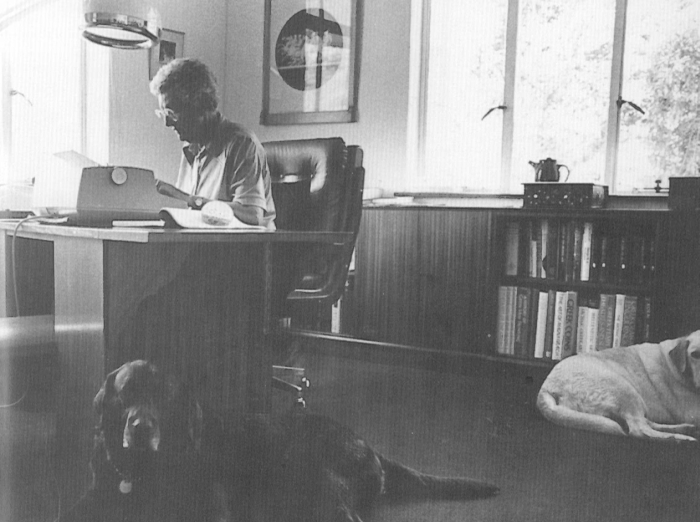
Renault working in her “Swiss Bank” study with Mandy and Coco, the dogs.

Renault and Mullard walking the dogs on the beach at Camps Bay in 1982.
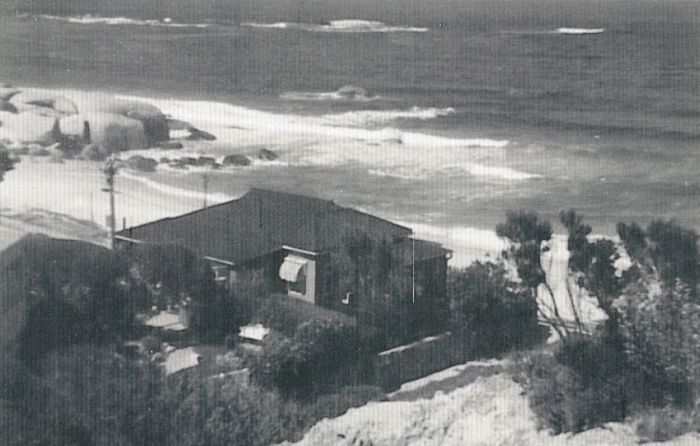
Delos, Greece, with a view over the beach at Camps Bay.
